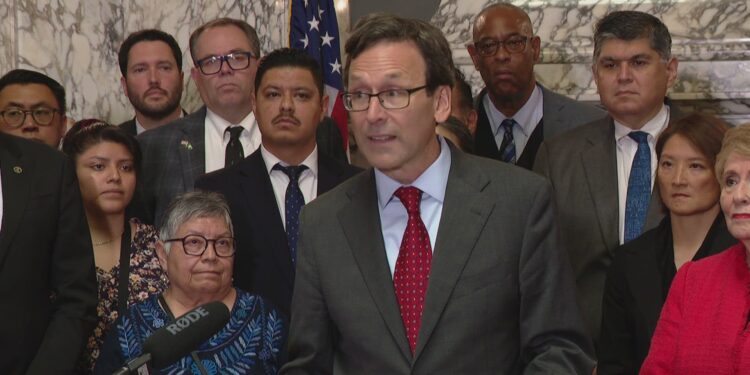Governor Bob Ferguson’s forceful rejection of federal threats over Washington’s sanctuary policies has set the stage for a potential constitutional clash that could define the balance between federal immigration enforcement and state autonomy under the Trump administration.
Ferguson’s formal response to Attorney General Pam Bondi, delivered Tuesday, escalated beyond typical state-federal disputes by characterizing federal pressure as “bullying” and accusing the Trump administration of pushing the country “closer to authoritarianism.” The exchange represents more than a policy disagreement, evolving into a fundamental debate about federal authority and state resistance.
The conflict centers on Washington’s 2019 Keep Washington Working Act, which limits how local and state law enforcement participate in federal immigration enforcement. Bondi’s August 13 letter designated Washington among 12 “sanctuary jurisdictions” and threatened criminal charges and federal funding cuts for non-compliance with immigration enforcement demands.
Bondi’s letter asserted that sanctuary policies “give aliens cover to perpetrate crimes in our communities and evade immigration consequences that federal law requires,” while threatening state officials with criminal prosecution for obstruction. The federal approach represents a significant escalation from previous administration tactics, moving beyond funding threats to criminal liability warnings.
Ferguson’s response challenged both the legal basis and the tone of federal demands, noting that Bondi failed to identify specific “policies and practices” that violate federal law or explain how Washington’s approach conflicts with controlling federal statutes. This legal critique suggests Ferguson believes the federal case lacks substantive foundation beyond political pressure.
The governor’s defense of the Keep Washington Working Act emphasizes its bipartisan support and practical benefits for law enforcement effectiveness. Ferguson argues the law allows state and local police to “focus on keeping Washingtonians safe, rather than allowing limited resources to be used for federal immigration enforcement,” a position supported by many police chiefs who prefer community trust over immigration enforcement roles.
The escalating rhetoric from both sides indicates this dispute will likely advance beyond political posturing to actual litigation. Ferguson explicitly stated his readiness to defend Washington in court and seek “all appropriate costs and fees” if the federal government pursues legal action, suggesting confidence in the state’s legal position.
For Washington residents, the confrontation affects more than abstract federalism principles. The state’s approach to immigration enforcement influences community policing strategies, resource allocation, and the daily experiences of immigrant communities who may be more or less likely to report crimes or cooperate with law enforcement depending on policy outcomes.
The sanctuary jurisdiction designation places Washington alongside other states including California, Illinois, and New York in federal crosshairs, creating potential for coordinated state resistance or individual capitulation depending on each state’s political calculus and legal assessment of federal authority.
Ferguson’s characterization of federal pressure as authoritarian reflects broader Democratic concerns about executive power expansion under the Trump administration. His promise to “defend our Democracy, the rule of law, and the people of my state” positions Washington as a bulwark against what he views as federal overreach.
The timing of this confrontation, early in the Trump administration’s second term, suggests it may serve as a test case for how far federal immigration enforcement can extend into state and local jurisdictions. The outcome could establish precedents affecting immigration policy implementation nationwide.
Legal experts note that sanctuary jurisdiction disputes typically involve complex constitutional questions about federal supremacy, state sovereignty, and the limits of federal coercion. The Supreme Court’s eventual involvement seems likely given the fundamental nature of the issues and the number of states potentially affected.
For Seattle and surrounding communities with significant immigrant populations, the policy outcome could substantially affect daily life, law enforcement relationships, and economic activity. The region’s technology and service industries rely heavily on immigrant workers whose participation in civic life may be influenced by local cooperation with federal enforcement.
Ferguson’s confrontational stance reflects both his legal background as former state attorney general and his political positioning as a progressive leader willing to challenge federal authority. His approach contrasts with governors who might seek accommodation or compromise with federal demands.







